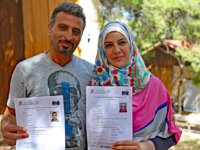Country: France
62% of times when an electronic device is broken their owner throw it away without thinking about repairing it, often encouraged by the industry. Consumers also think the information about "repairability" is hardly available at time of purchase.
DITP created an indicator understandable and usable by consumers. Different types of labels were created to be tested in the field. Their clarity and impact on consumer's purchase decision were scientifically evaluated.
BI Project
Applying behavioural science to decrease air contamination from woodheating in Ile de France
More than 480 000 people in Ile de France use an inefficient woodheating device releasing high quantities of particulate matters in the environment but do not always link air pollution and woodheating.
This project aimed to inform the inhabitants about this link and encourage them to renew their ancient devices and adopt good practices around woodheating.
281 households were equiped with particulate matter sensors and the DITP compared the evolution of contamination between groups, divided in…
30% of the requests CNAM (Primary health care institution in France) receives by phone or email could be made and treated online. In order to encourage use of online services, the CNAM solicited help from the DITP. This dematerialization would benefit the user by easing the access to services, to the administration workers by improving their work conditions and to the institutions through gains in efficience.
We chose to target a precise procedure: ordering a Carte Vitale (Health Care card) for…
The European Qualifications Passport for Refugees is a unique instrument providing refugees with an assessment of qualifications that cannot be fully documented. Based on the Lisbon Recognition Convention (Council of Europe/UNESCO), the methodology tested by the Council of Europe, the UNHCR, nine countries, National Recognition Centres and universities enables refugees to have their qualifications accepted across borders to continue their studies or find a job related to their education.
Covid-19 Response
Téléportation des acteurs d’une relation pédagogique dans un environnement virtuel…
• Démocratiser l’accès à la connaissance
• Eviter le décrochage scolaire
• Favoriser la pédagogie différenciée
• Former les équipes pédagogiques aux nouvelles pratiques et à l’utilisation des nouvelles technologies.
• Répondre aux problèmes de rupture de la continuité pédagogique en cas de crise grave ou catastrophe naturelle
• Offrir une structure scolaire et éducative complète (virtuelle) dans les lieux démunis de structure éducative
The Ministry of Solidarity and Health (through Santé publique France) is publishing several COVID-19 related datasets on the national open data portal: 1) Daily hospital data by department and sex of the patient: number of hospitalized patients, number of people currently in intensive care, cumulative number of people who returned home, cumulative number of deceased people. 2) Daily data relating to hospitals by department: cumulative number of services having declared at least one case. 3)…
Covid-19 Response
France bails out AirFrance on the condition they cancel domestic flights competing with trainlines
France has launched a €7bn bailout to help Air France deal with the economic fallout, but with various innovative environmental conditionalities attached.
The support will include a state guarantee on loans and a subordinated shareholder loan to the company by France.
The money is contingent on the carrier reducing pollution by scrapping certain domestic flights, in which travelling by train is a viable option.
Economy and Finance Minister Bruno Le Maire said the coronavirus crisis provided…

